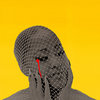Album Review: Please Don't Cry, by Rapsody
Rapsody's first album in five years is a tender, expansive look at the distorting mirror of self-image.

There’s a surprisingly unsettling moment early in Please Don’t Cry. It happens during the second verse of “Look What You’ve Done,” but it’s easy to miss amidst the song’s lush sonics: a gently bobbing bassline lapping against a shuffling kick-rimshot pattern, muted clarion trumpets, textured harp glissandos, and the breathy sigh of a disembodied vocal — there’s a lot to take in. But pay close attention to the first eight bars, and you’ll notice how Rapsody’s voice slowly pitch-shifts, seesawing between a helium balloon soprano and a screwed-down codeine crawl. The effect loops for eight bars, Rap stretching the ends of her lines as if peeling off a latex face mask. The ambient dread settles like stale air, Rap wondering which of her many intersecting identities — venerated rapper, Black woman — people actually accept. It’s the entire album in miniature, an apt metaphor explaining how constantly bending toward others’ ideas will render you unrecognizable to yourself.

At 41, Rapsody’s built an enviable CV. The Snow Hill-raised, Roc Nation-signed emcee was a founding member of NC State hip-hop collective H20 in 2004, from which the still-active group Kooley High emerged. She launched her solo career in 2008, racked up work with the likes of Mac Miller, Big Daddy Kane, and Kendrick Lamar, and received two Grammy nominations in 2017 — including Best Rap Album — for her second solo effort, Laila’s Wisdom. Her last album, 2019’s Eve, was a tribute to Black women, Rap naming each song after one of her particular inspirations: Oprah, Aaliyah, Nina Simone.
In the intervening five years, it’s clear Rapsody’s been through some things. There’s been a more pronounced inward shift, as Rap reassesses her career, relationships, and the moral struggles that come with living for nearly half a century. If it were darker or less confident, Please Don’t Cry might be seen as a mid-life crisis record. But instead, it’s a tender acknowledgment that one’s identity isn’t static — a long look in a distorted mirror, understanding that beneath the warped image is still the self.
It’s this revelation that makes Please Don’t Cry Rapsody’s most exploratory work yet. She trades the warm, golden-hour sound of Jamla’s Soul Council for an expansive palette of R&B, reggae, Dungeon Family funk, and bombastic trap, sourcing production from mainstream heavies like S1, Hit-Boy, and BLK ODYSSY. The piano, which Rap told Stereogum is her favorite instrument, plays a central role throughout: “When we were making this album, I wanted it to be raw emotion, so a lot of the songs started out with the piano,” she explained. Rather than undermine the album’s sense of direction, the beat switches and the constant blurring of genre lines only reinforce the themes Rapsody grapples with. It’s all an attempt to answer the question that looms over Please Don’t Cry, asked twice within the first five minutes: “Do you even know who you are?”
Her answers are complex, often leading to more questions. On songs like “3:AM” and “That One Time,” Rap ponders the lessons that come from failed relationships. She understands the value of alone time, disconnecting herself from those who feel entitled to her time and energy on “DND (It’s Not Personal).” There’s a reassertion of her sexuality during “Lonely Women,” which features a narrator relearning how to experience pleasure. And then, of course, there’s the joy of rapping: there are few moments on Please Don’t Cry where Rap sounds as gleeful behind the mic as during the Lil Wayne-assisted, dusty boom-bap barfest of “Raw.” It’s Rapsody at her most mutable; her elastic flows, layered writing, and adventurous production choices feel incredibly self-assured despite the existential anguish beneath. It’s a portrait of a complicated person, an incredibly human look at aging, an understanding that the work of finding oneself is a lifelong process.

Listen to Please Don't Cry on Apple Music | Spotify | Bandcamp
Dash Lewis has written for Pitchfork, Bandcamp, The Guardian, Resident Advisor, The Sun Magazine, Passion of the Weiss, and many more. When not thumbing through his record collection or stressing at a blank Google Docs screen, he spends his time petting his two cats and searching for a great sandwich. He grew up in Durham, NC and now resides a couple hours north in Richmond, VA.


